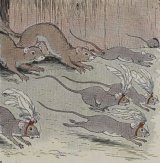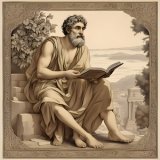The Mice and the Weasels
The Mice and the Weasels is a fable by Aesop that portrays the conflict between two species; mice and weasels. The mice, realizing they are constantly at a disadvantage against the weasels, decide to equip themselves with horns for protection. However, the horns end up being more of a burden, causing the mice to get trapped and killed more frequently. The story carries a cautionary message about the dangers of unnecessary boastfulness and the ill-judged imitation of the powerful.
The Weasels and the Mice were always up in arms against each other. In every battle the Weasels carried off the victory, as well as a large number of the Mice, which they ate for dinner next day. In despair the Mice called a council, and there it was decided that the Mouse army was always beaten because it had no leaders. So a large number of generals and commanders were appointed from among the most eminent Mice. To distinguish themselves from the soldiers in the ranks, the new leaders proudly bound on their heads lofty crests and ornaments of feathers or straw. Then after long preparation of the Mouse army in all the arts of war, they sent a challenge to the Weasels. The Weasels accepted the challenge with eagerness, for they were always ready for a fight when a meal was in sight. They immediately attacked the Mouse army in large numbers. Soon the Mouse line gave way before the attack and the whole army fled for cover. The privates easily slipped into their holes, but the Mouse leaders could not squeeze through the narrow openings because of their head-dresses. Not one escaped the teeth of the hungry Weasels. Greatness has its penalties.
Translation
Translate and read this book in other languages:
Select another language:
- - Select -
- 简体中文 (Chinese - Simplified)
- 繁體中文 (Chinese - Traditional)
- Español (Spanish)
- Esperanto (Esperanto)
- 日本語 (Japanese)
- Português (Portuguese)
- Deutsch (German)
- العربية (Arabic)
- Français (French)
- Русский (Russian)
- ಕನ್ನಡ (Kannada)
- 한국어 (Korean)
- עברית (Hebrew)
- Gaeilge (Irish)
- Українська (Ukrainian)
- اردو (Urdu)
- Magyar (Hungarian)
- मानक हिन्दी (Hindi)
- Indonesia (Indonesian)
- Italiano (Italian)
- தமிழ் (Tamil)
- Türkçe (Turkish)
- తెలుగు (Telugu)
- ภาษาไทย (Thai)
- Tiếng Việt (Vietnamese)
- Čeština (Czech)
- Polski (Polish)
- Bahasa Indonesia (Indonesian)
- Românește (Romanian)
- Nederlands (Dutch)
- Ελληνικά (Greek)
- Latinum (Latin)
- Svenska (Swedish)
- Dansk (Danish)
- Suomi (Finnish)
- فارسی (Persian)
- ייִדיש (Yiddish)
- հայերեն (Armenian)
- Norsk (Norwegian)
- English (English)
Citation
Use the citation below to add this book to your bibliography:
Style:MLAChicagoAPA
"The Mice and the Weasels Books." Literature.com. STANDS4 LLC, 2025. Web. 22 Feb. 2025. <https://www.literature.com/book/the_mice_and_the_weasels_2316>.








Discuss this The Mice and the Weasels book with the community:
Report Comment
We're doing our best to make sure our content is useful, accurate and safe.
If by any chance you spot an inappropriate comment while navigating through our website please use this form to let us know, and we'll take care of it shortly.
Attachment
You need to be logged in to favorite.
Log In